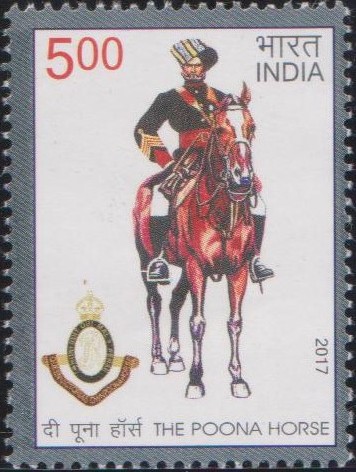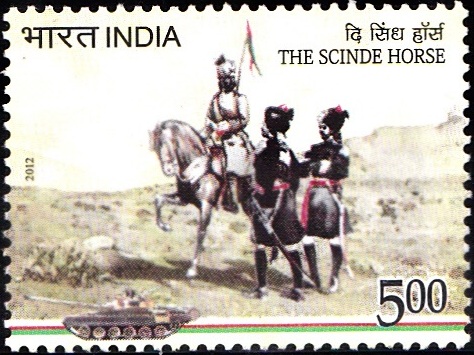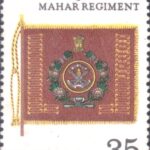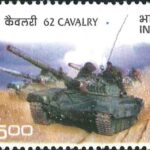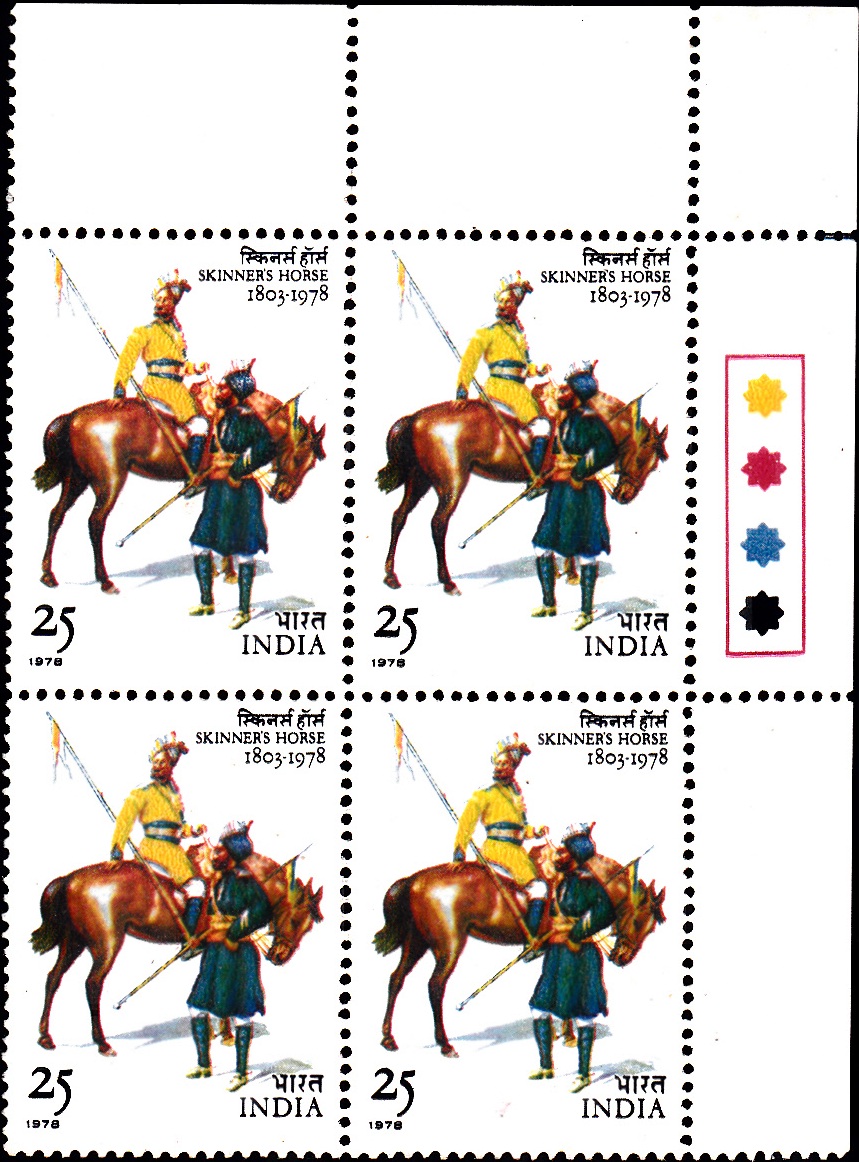
Skinner’s Horse
A commemorative postage stamp on the 175th Anniversary of the 1st Horse (Skinner’s Horse), an Indian Army cavalry regiment :
Issued on Nov 25, 1978
Issued for : The P & T Department is happy to join in the celebration of the 175th anniversary of the Skinner’s Horse by bringing out a commemorative stamp.
Description of Design : The portrait on the stamp shows two Sowars of the Skinner’s two units in their respective uniforms early in the 20th century.
Type : Block of 4 Stamps with TL (Traffic Light), Mint Condition
Colour : Multicolour
Denomination : 25 Paise
Overall size : 3.91 X 2.90 cms.
Printing size : 3.55 X 2.54 cms.
Perforation : 13 X 13
Watermark : Printed on unwatermarked adhesive stamp paper
Number printed : 30,00,000
Number per issue sheet : 35
Printing process : Photogravure
Designed and printed at : India Security Press
About :
- The name seems foreign, but it is in fact the name of an illustrious Indian family which has made its home in Uttar Pradesh, Delhi and Haryana for nearly 200 years. James Skinner, the founder of this family and the crack cavalry regiment that bears his name was the son of a Scottish father and a Muslim Rajputni mother. Being half-Indian, young Skinner was not permitted to join either the British or the Indian wings of the East India Company‘s army. He, therefore, offered his sword to the Marhattas and in 1795 joined the Regular Army of Maharaja Daulat Rao Scindia. For the next eight years, Skinner learnt the soldier’s trade and won his spurs in battle after battle and was rewarded with the command of three battalions at the age of 22. When the British and the Marhattas fought for the control of Delhi and Doab in 1803 Skinner was dismissed from Scindia‘s service and reluctantly sought British protection. He ultimately agreed to raise and lead a force of horsemen from among his old comrades after obtaining a promise that they would not be employed against the Scindias.
- During the first 136 years that the Skinner‘s fought on horses, they became famous for their speed and boldness, mastery of personal weapons, be they swords, lances, muskets or carbines and a self-assurance enshrined in their Persian motto “Himmat–i–Mardan, Madad–e–Khuda” (God helps those who help themselves). Time and again they proved invaluable as advance guards, protectors and escorts of convoys and masters in pursuit. When they shed their horses in favour of armoured cars and light tanks, they maintained their reputation as fast, furious and fearless warriors.
- From 1803 to the present day the Skinner’s Horse have distinguished themselves in campaigns all over Asia, India, Afghanistan and China and on the battle-field of the First and Second World Wars. Since Independence, the Regiment has earned fresh laurels in whatever role has been allotted to it as a Recce Regiment of the Armoured Division in Hyderabad Police Action of 1948, in war-readiness on the Punjab border, on internal security duties in Uttar Pradesh and as the divisional tank regiment in the capture of Dograi in the Indo-Pak war in 1965. In 1966 the Regiment changed over to new medium tanks and became part of an armoured brigade. In the operations resulting from the Pakistani aggression against our Western frontiers, the Regiment was launched into battle from the Samba sector and later switched to the Shakargarh area. In the tank encounters the Regiment shot 14 Pakistani tanks for its own loss of only two.
- Throughout their history, the Skinner’s have retained the traditional dress of the country, taking a great personal pride in their appearance and turn-out. The two units of the Regiment which began with the famous yellow uniform diverged in 1861 when the 3rd Skinner’s Horse changed first to red, then to drab and finally to blue with yellow facings.
- Even now when the old colourful uniforms have given place to the functional olive green, it is possible to distinguish a Yellow Boy by his distinctive badge and immaculate turn-out.
- As becomes a body of expert horseman, the Skinner’s are adept at all sports particularly those which require the handling of weapons and horses such as marksmanship, shikar, polo, trick riding and tent-pegging. It is worth noting that the tent-pegging which Skinner had learned from the Marhattas was first introduced by him into the Indian Army.


